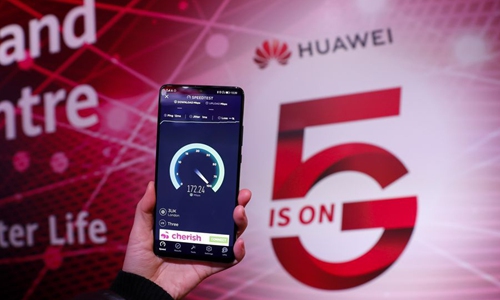US may not be able to build own 5G club with decoupling mindset: expert
Source: Global Times Published: 2020/7/21 23:16:07

Photo: Xinhua
As the Trump administration intends to pull China into a new Cold War, it is set to continue tightening its overbearing technology blockade. China's basic scientific research and high-tech fields will feel more pressure.The US' crackdown on the Chinese tech sector did not begin with the Trump administration. Chinese telecoms giant ZTE has been grappling with challenges in the US dating back to the Obama administration. Even if Joe Biden, the Democratic candidate for president, takes office, he will only launch different attacks to contain China's technological development.
However, in the face of a deteriorating external environment, China should realize that a US-China tech decoupling is unlikely to occur, and China should formulate response strategies based on such a judgment.
For starters, modern technologies are too complicated for a single country to fully master them by itself. There are at least seven or eight countries participating in the mobile phone global industrial chain, for example. The iPhone is produced across different countries.
In terms of 5G technology, the US may not be able to build its own 5G club by pressuring countries to exclude Huawei, which has occupied a large market share in the field. 5G technical standards are formulated by large companies in many countries. Huawei has reached an internationally leading level, and its role in the development of technical standards cannot be simply ruled out.
Therefore, it is unrealistic for the US to completely decouple its technology from China. The US originally tried restricting its companies from discussing 5G standards with Huawei, but now it has had to release that restriction because Huawei can no longer be ignored.
Second, US companies will play a role in influencing their government's decisions. And China's huge market will naturally form market rights. More than half of Qualcomm's chip sales are in China, thus if it is banned from selling products to the Chinese market, the company will not be able to survive. Qualcomm said that it aims to occupy 90 percent of China's 5G chip market this year, unwilling to lose the Chinese market. As Qualcomm and other US companies know that China is a huge market, they will lobby the US government. In addition to US firms, companies in other countries or regions should also be considered. Many are betting on both sides simultaneously. Dutch company ASML, the world's most advanced manufacturer of chip equipment, has made investments in Suzhou, East China's Jiangsu Province.
In short, although the "new Cold War", it will not lead to the formation of two parallel technological systems.
Yet China should realize that geo-competition is irreconcilable no matter who is president of the US. Due to geographic competition, technological competition is also irreconcilable.
Therefore the technological blockade of China by the US and Europe will probably continue, and China's must develop new strategies for its technological progress. There is a long way to go.
China must achieve technological independence in key areas and push for unified technical standards, all while enduring a restrictive environment and peacefully competing with the US.
China should strive to make breakthroughs in several key technologies like chips and engine technology. The slow breakthroughs in China's engine technology are due to material technology limitations, and China's lack of development in many engineering fields can only be solved with time. Chinese chips are not independent in two key areas: auxiliary design software and lithography machine technology. It may take China five to eight years to reach substantial breakthroughs in these two processes and emerge from its external dependence.
The article was compiled based on a recent speech delivered by Yao Yang, director of the China Center for Economic Research at Peking University. bizopinion@globaltimes.com.cn
Posted in: EXPERT ASSESSMENT